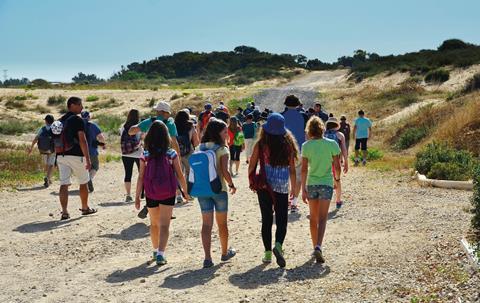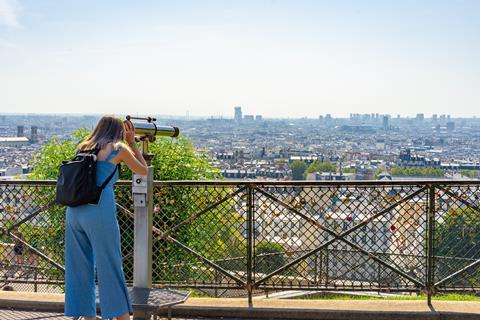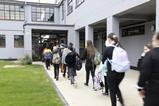Simplifying the paperwork for school trips to Europe was also on the list of recommendations put forward at an All Party Parliamentary Group meeting on modern foreign languages.

Organisations and teachers came together to discuss ways to make school visits to Europe easier post-Brexit and post-Covid.
The meeting of the All Party Parliamentary Party (APPG) Group on Modern Languages meeting on 13th November opened with comments from Gill Harvey, CEO of the School Travel Forum, the association for UK companies offering educational visits and tours, who said: “We all want as many children as possible to go on these valuable school trips.”
Evidence was presented from various people from across the schools’ sector on the impacts on international experiences as well as solutions to help the challenges. There were a number of recommendations put forward to the Department for Education including the idea of a minister with responsibility for school visits.
Gill Harvey told us: “We really do need a champion across the different departments so this would be an ideal scenario.”
Nicola Chandler, head of modern foreign languages (MFL) at Queen Elizabeth School in Kent agreed that it made “absolute sense” to have a minister focusing on school visits and said she was shocked there wasn’t one already.
“For many of the children it’s the first time they have been abroad so it’s getting that experience of immersing themselves in another culture, language and country which is incredible.”
Nicola Chandler, head of MFL, Queen Elizabeth School, Kent
The meeting, chaired by Baroness Coussins, vice chair of the APPG, heard about concerns affecting ease of travel between the UK and Europe, especially for school groups. These ranged from difficulty in finding the correct entry requirements for school parties into Europe, additional border checks and problems with the collective/group passports.
We asked the Department for Education for its response and a government spokesperson said: “Educational trips can have significant benefits for children’s development, and it is for schools to manage how they integrate them into the curriculum.
“In March the Prime Minister met with French President Emmanuel Macron and committed to ease the travel of school groups to the UK by making changes to documentary requirements for schoolchildren on organised trips from France.”
STO editor Keeley Rodgers attended the APPG meeting on 13th November and said: “What is abundantly clear is that everyone is in agreeance - school visits, in particular those abroad, are absolutely crucial experiences for our young people. There is no shortage of passion and determination from all involved to ensure as many students as possible continue to have these opportunities.
“It was a very positive meeting with a clear list of recommendations. Let’s hope it leads to solutions and the appropriate next steps.”
Reducing paperwork and reinstating Travellers List among actions called for
The other recommendations outlined at the meeting included:
- Simplifying guidance on Schengen Visas. Post-Brexit, there has been confusion about the pupils who need visas for short visits to the Schengen Area which covers most of the EU plus several other countries.
- To reinstate the Travellers List (issued by the British Council): Previously the list allowed children on a school group, who did not have a UK passport, to travel without a visa. This is no longer the case.
- Pupil Premium students to be given free passports.
- A review of paperwork needed, particularly regarding DBS checks relating to foreign exchange programmes.
Suzanne O’Farrell from the Association of School and College Leaders said a teacher’s time was a headteacher’s most precious resource and therefore anything that can be done to ease the load when it comes to school trips was vital. She told the meeting: “There’s no greater impact than a cultural visit abroad which, for many students, can be life-changing.”

Teachers share the impact overseas visits have
Two teachers spoke of their experience of taking students abroad. Nicola Chandler, head of MFL at Queen Elizabeth School in Kent said they ran a successful German exchange programme with a school in Cologne which had been operating for more than 70 years. They have also recently set up a Spanish exchange project.
Nicola explained: “These are very important to us as a school. For many of the children it’s the first time they have been abroad so it’s getting that experience of immersing themselves in another culture, language and country which is incredible.

“Particularly with the exchanges, it’s exciting for the students to try and communicate with people in a different language and they can embrace differences and dispel some of the stereotypes they may have had.”
Natalie Boniface, head of languages faculty and international schools coordinator at Hoe Valley School, Woking, said there needed to be more clarity about what’s needed for students travelling abroad. She told us: “I’m determined to continue ensuring our students can have these experiences because they are so educationally valuable and so beneficial. I want to open their minds and raise their aspirations so that they can see they can achieve anything.”
Liz Black, president of the Association for Language Learning, said she had heard from teachers and heads of department at several schools about how valuable language trips to Europe were for the students.
She told the meeting: “It was an absolute joy to hear about how much children of all ages were able to see wider perspectives, develop global thinking, tolerance and empathy towards others because of going on these school visits.”
“There’s no greater impact than a cultural visit abroad which, for many students, can be life-changing.”
Suzanne O’Farrell, Association of School and College Leaders
Encouraging meeting to help schools plan trips abroad
Speaking after the meeting, Gill Harvey said: “It was heartening to hear the APPG on Modern Languages confirm their understanding of how valuable school visits are for children and that they will support our efforts to simplify the planning of these overseas visits and to keep costs down where possible.”
Anne Hunt, CEO of the Council for Learning Outside the Classroom, also attended the meeting and said it was great to see the APPG “give their endorsement for creation of an action plan of pragmatic options for overcoming some of the very real challenges facing those involved in planning and delivering educational visits overseas.”
















No comments yet